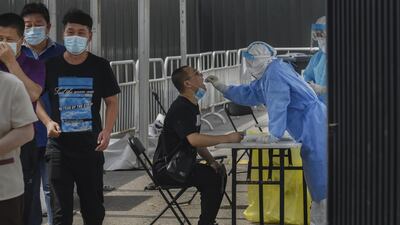China defended the World Health Organisation and lashed out at the US decision to withdraw from the UN body, adding to a litany of disputes between the world’s largest economies and increasing geopolitical rivals.
Foreign ministry spokesperson Zhao Lijian said the move was “another demonstration of the US pursuing unilateralism, withdrawing from groups and breaking contracts.”
The WHO is “the most authoritative and professional international institution in the field of global public health security,” Mr Zhao said at a briefing Wednesday, adding that the US departure would particularly hurt developing countries in need of international support.
The WHO plans to send a team to China to investigate the source of the virus, which was first detected in the central city of Wuhan last year. China has said it remains unclear where the virus originated and has rejected an independent probe, but reiterated this week that it is working closely with the WHO and will “continue to support scientists from all countries to carry out global scientific research on the source and spread of viruses”.
President Donald Trump has harshly criticised the WHO over its response to the coronavirus pandemic and accused it of bowing to Chinese influence. Mr Trump said in a White House announcement that Chinese officials “ignored” their reporting obligations to the WHO and pressured the organisation to mislead the public about an outbreak that has now killed more than 130,000 Americans.
In comments Wednesday, US Secretary of State Mike Pompeo said Beijing’s response to the virus outbreak showed the ruling Communist Party has an “enormous credibility problem” and that its actions fitted a pattern of behaviour that threatens freedom, democracy and the rule of law.
“I am convinced more than ever that the free peoples of the world will come to understand the threat that’s presented not only internally inside of China, but importantly, that the impact that General Secretary Xi has on the world is not good for free peoples and democracy-loving peoples,” Mr Pompeo told reporters.
The Trump administration formally notified the UN on Monday of its withdrawal from the WHO, although the pullout won’t take effect until July 6, 2021. That means it could be reversed by a new administration or if circumstances change.
Former Vice President Joe Biden, the presumptive Democratic presidential nominee, said he would reverse the decision on his first day in office if elected.
Health officials and critics of Mr Trump’s administration say the withdrawal would cost the US influence in the global arena while undermining an important institution that is leading vaccine development efforts and drug trials to address the coronavirus.
The US is the WHO’s largest donor and provides it with more than US$450 million per year, but owes about $200 million in current and past dues. Those financial obligations must be met before a US withdrawal can be finalised.
Apart from the WHO, China and the US have tangled over human rights, China’s crackdown on dissent in Hong Kong and Xinjiang and its assertions of sovereignty over strategic waters and islands in the South China Sea. The two are also engaged in a protracted trade dispute amid allegations China is forcing companies to hand over technology or stealing the knowledge outright.
















